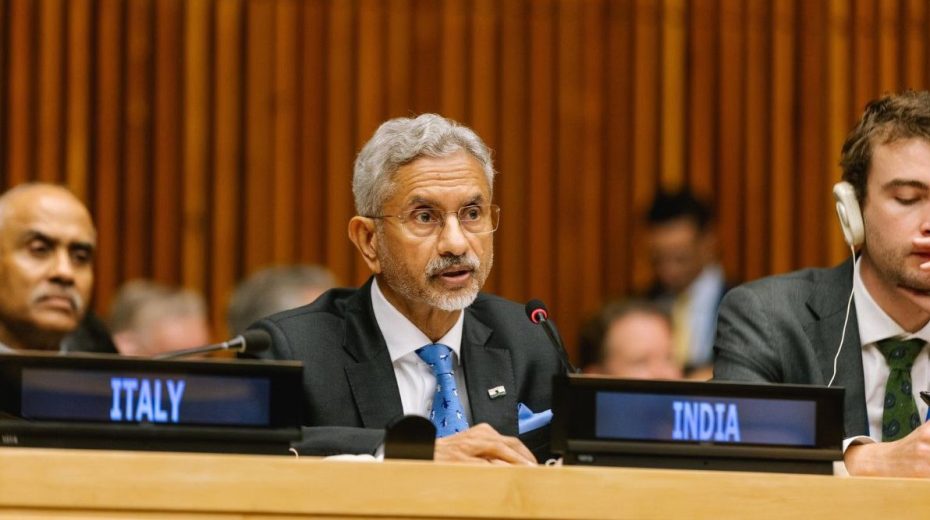
Strongly criticising use of tariffs & sanctions on countries keeping ties with Russia, the minister indicated that the end to conflict can only be achieved via diplomatic means.
New Delhi: External Affairs Minister S. Jaishankar sharply criticised the US and European Union (EU) on Thursday for their “double standards,” cautioning that imposing additional sanctions and tariffs “cannot facilitate peace.”
Addressing the G20 Foreign Ministers’ Meeting alongside the United Nations General Assembly, he remarked, “Peace can certainly enable development, but by threatening development we cannot facilitate peace. Making energy and other essentials more uncertain in an economically fragile situation helps no one. Therefore, the way out is to move the needle towards dialogue and diplomacy, not in the opposite direction towards further complications.”
He further observed that recently, “international peace and global development” have “deteriorated in parallel,” bearing heavy costs on emerging economies especially concerning energy, food, and fertiliser security. “Apart from jeopardising supplies and logistics, access and costs themselves became pressure points on nations. Double standards are clearly in evidence,” he said.
These comments come amid growing attention on New Delhi for sustaining relations with Russia, notably in energy trade. Just last month, the US slapped an extra 25 percent tariff on Indian imports as a “penalty” due to India’s ongoing purchase of Russian oil.
India’s Russian energy imports reached $56 billion last year. US President Donald Trump criticised this aspect of India-Russia engagement and urged New Delhi to cut back on Moscow oil. White House Trade Counsellor Peter Navarro also publicly disparaged the Indian government, even referring to the Russia-Ukraine conflict as “Modi’s war.”
The EU has announced plans for further sanctions soon, with its High Representative for Foreign Affairs, Kaja Kallas, warning last week that India’s sustained strategic relationship with Moscow poses an “obstacle for closer ties.”
India has pushed back against mounting Western pressure over its Russia ties. A statement from New Delhi last month pointed out ongoing trade between the EU and Russia in fields like oil, gas, fertilisers, and mining materials. The Ministry of External Affairs also underscored continued US commerce with Russia despite Washington’s focus on limiting India-Russia connections.
On Thursday, Jaishankar proposed that India’s unique position to “engage both sides” should be “utilised by the international community” to advance peaceful resolutions. Throughout the nearly four-year conflict, New Delhi has maintained relations with both Russia and Ukraine, with Prime Minister Narendra Modi visiting Moscow and Kyiv last year.
Russian President Vladimir Putin is set to travel to India later this year for the annual bilateral summit. India has expressed willingness to play a constructive role in ending the Russia-Ukraine conflict, asserting that the resolution lies purely in diplomatic efforts and that ongoing fighting will not solve the crisis.
In recent times, the US and EU have also highlighted China’s continued partnership with Russia, urging Beijing to use its influence to promote peace in the war.
Ending the Russia-Ukraine conflict, which started in February 2022, remains a central objective for Trump should he win a second term. During his campaign last year, he promised to halt the war within 24 hours. Despite meeting Putin in Alaska on 15 August, progress towards resolving the conflict has stalled.
Although partial ceasefires were agreed upon earlier this year, these have failed to produce significant reductions in hostilities. Ukrainian President Volodymyr Zelenskyy has expressed openness to an unconditional ceasefire that could pave the way for peace talks.
There have also been proposals for a multinational peacekeeping force in Ukraine to help maintain peace between Moscow and Kyiv if a truce is achieved. Still, fighting continues unabated, with Zelenskyy reporting recent territorial gains by Ukrainian forces during a recent offensive.
(Edited by Mannat Chugh)
Original article: theprint.in




